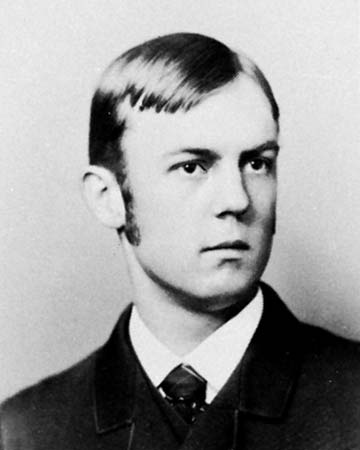TL;DR -- The Economist is British and published weekly. We like their humor plus their take on matters across the globe. But, given that England is a large part of our history, we appreciate their in-depth reports on things over here. Recently, they mentioned Charles Horton Cooley. Per usual, we went looking. Hence, the following. And, the implications of all of this? Stay tuned.
---
A recent issue of The Economist had an OpEd on the origins of "soc med" and provided some details about engineering and science, in a humanist sense, and the messes of the internet gone bad. We like The Economist and read, at least, their double issue that is published in late December of each year. But, we sample issues from time to time.
Charles Horton Cooley was born in Michigan. His father, who was the Chief Justice of the Supreme Court of Michigan was born in New York. WikiTree did not show data past Charles' grandfather. However, records at FindAGrave (follow links for parents at each generation) suggest that Charles is a descendant of early New England pioneers. That is of interest to our research from the historical sense. Too, Charles was a sociologist. He coined "social media" in 1897.Reading further, Wikipedia has an article (that needs a little TLC) on the "Looking-glass self" of Charles which considers how the concept applies to social media (his neologism) especially of the type that we see now, over 150 years later of meddling with life by science, engineering, and technology.
---
Staying with the times, here is what Gemini (becoming a drag on Google - tsk, guys - I really liked Bard and its representation choices) says:
- Charles Horton Cooley is credited with the term "social media," which he coined over a century ago in 1897, even though the concept of social media as we know it today didn't exist at the time; this is significant because his work focused on how individuals perceive themselves based on how they believe others see them, which aligns with the idea of how people present themselves online through social platforms.
---
Now, we have been pursing the study of computing, since Kant, through mathematics, science and engineering without consideration of the "social/personal" sciences. Even though, we might add, that we see people as more complicated than anything that physics deals with in its fantasy (cosmology) or destructive modes (reductionist's grappling with wannabe particles and/or waves).
About Kant? He was before the expansion of mathematics that happened in the 19th century. But, there was general increases in most areas of study during that time. We need know about that. Too, we are fortunate to have the American experience as a provider of threads for research.
So, knowing things of his time (coincident with our Revolution), he stressed that we need to look at Reason as source of our abilities to know a priori and to cogitate from that in his analytic sense. All else is synthetic. Too, Kant was right on the target as he showed what modern theorem provers know: we cannot prove the existence nor the non-existence of God via logic (Kant's Prolegomena and Logic). It is a matter of choice. Right there? Free will. But, we will save this discussion for later.
For now, please understand (Kant's emphasis) that the 400 years of the colonies that started the U.S. 250 years ago gave (give) adequate support for a new basis. Note, we are not using new science as did Wolfram. We just started to dig and can name four names of note in the American contributions: Count Rumford; Nathaniel Bowditch; Josiah Willard Gibbs; and James Bryant Conant. We could pick more (Peirce - father and son - Benjamin and C.S.),
Notes:
- 1. See Charles Horton Cooley. The Social Self -- 1. The Meaning of "I", Chapter 5 in Human Nature and the Social Order (Revised Edition). New York: Charles Scribner's Sons, (1922): 168-210.
- On education, see our post on the Nobel influence. We will get more into that as the colonies (U.S.) took up education, in general, early on. There lots of things that were done in the U.S. of note beyond running after optimization which is freedom taken to an extreme and stupid as hell.
- 2. John's education was classical in scope (four years of Latin, mathematics, and science - ages ago, in high school). As such, he strongly thinks that education ought to be Liberal Arts and Sciences (and engineering - get those ones involved in learning about the world before they screw it up, please). This cursory remark will be expanded over time as we deal with the 250th and the various 400ths before that. The American Dream is more "light on a hill" than ruling the world.
- 3. Now, that the C-Suite is running after the illusion of GenAI wholehog, what can we do? Look at "humanist mathematics" for one thing. That is, we have to persevere in pursuit of truth across levels from atoms up to the ethereal. By doing so, we will get science and engineering back on track, as well, one might hope.
02/18/2025 --

No comments:
Post a Comment